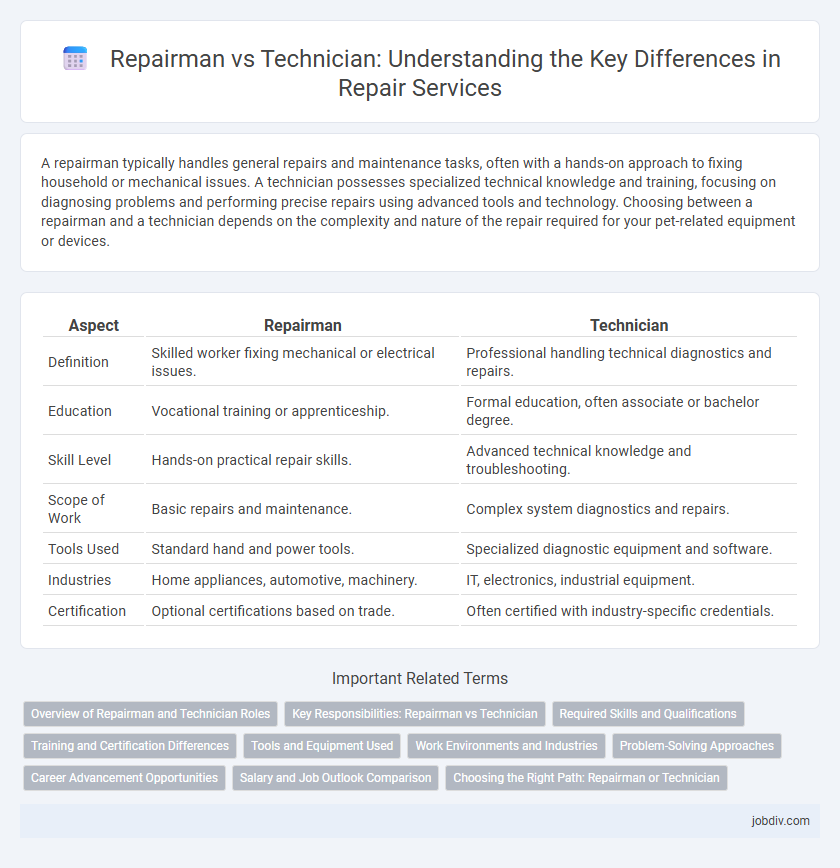A repairman typically handles general repairs and maintenance tasks, often with a hands-on approach to fixing household or mechanical issues. A technician possesses specialized technical knowledge and training, focusing on diagnosing problems and performing precise repairs using advanced tools and technology. Choosing between a repairman and a technician depends on the complexity and nature of the repair required for your pet-related equipment or devices.
Table of Comparison
| Aspect | Repairman | Technician |
|---|---|---|
| Definition | Skilled worker fixing mechanical or electrical issues. | Professional handling technical diagnostics and repairs. |
| Education | Vocational training or apprenticeship. | Formal education, often associate or bachelor degree. |
| Skill Level | Hands-on practical repair skills. | Advanced technical knowledge and troubleshooting. |
| Scope of Work | Basic repairs and maintenance. | Complex system diagnostics and repairs. |
| Tools Used | Standard hand and power tools. | Specialized diagnostic equipment and software. |
| Industries | Home appliances, automotive, machinery. | IT, electronics, industrial equipment. |
| Certification | Optional certifications based on trade. | Often certified with industry-specific credentials. |
Overview of Repairman and Technician Roles
Repairmen specialize in hands-on maintenance, focusing on fixing mechanical and electrical equipment using practical skills and tools. Technicians combine technical knowledge with diagnostic expertise to troubleshoot, repair, and optimize systems often involving electronics, software, or machinery. Both roles demand problem-solving abilities, but technicians typically require formal training and certifications related to specific technologies or industries.
Key Responsibilities: Repairman vs Technician
Repairmen typically focus on hands-on tasks such as fixing mechanical issues, performing routine maintenance, and replacing faulty parts in various equipment. Technicians often handle more specialized responsibilities, including diagnosing complex problems using advanced tools, conducting system tests, and ensuring compliance with technical standards. Both roles require technical skills, but technicians usually possess deeper expertise in electronic systems and diagnostics compared to general repairmen.
Required Skills and Qualifications
A repairman typically requires hands-on experience, mechanical aptitude, and basic diagnostic skills to troubleshoot and fix common equipment issues. A technician demands more advanced qualifications, including specialized technical training, proficiency in using diagnostic tools, and often certification in specific systems or technologies. Both roles benefit from problem-solving abilities, but technicians are expected to possess deeper knowledge of electronic systems and software troubleshooting.
Training and Certification Differences
Repairmen typically gain skills through on-the-job training and may not require formal certification, focusing on hands-on experience for common repair tasks. Technicians often undergo specialized education and hold industry-recognized certifications such as CompTIA A+ or HVAC certifications, ensuring a standardized level of expertise. Certified technicians demonstrate proficiency in advanced diagnostics, compliance with safety standards, and use of technical tools, distinguishing them from general repairmen.
Tools and Equipment Used
Repairmen typically use handheld tools such as screwdrivers, wrenches, pliers, and basic diagnostic meters for general repairs in plumbing, electrical, or mechanical contexts. Technicians often rely on specialized equipment like oscilloscopes, multimeters, computer diagnostic software, and precision instruments tailored to their specific technical field, including HVAC, automotive, or IT systems. The choice of tools distinguishes repairmen's broad manual skills from technicians' expertise in using advanced technology for troubleshooting and maintenance.
Work Environments and Industries
Repairmen typically work in hands-on environments such as construction sites, manufacturing plants, and residential settings, handling routine maintenance and repairs on mechanical systems and equipment. Technicians often operate in specialized industries like information technology, telecommunications, and medical equipment, requiring technical expertise to troubleshoot and repair complex electronic or digital devices. Both roles demand adaptability, but technicians usually engage more with diagnostic tools and software in controlled environments, whereas repairmen may face variable, physically demanding conditions.
Problem-Solving Approaches
Repairmen typically rely on hands-on experience and practical troubleshooting techniques to identify and fix issues quickly, often using standard tools and procedures. Technicians employ more analytical and systematic problem-solving approaches, utilizing diagnostic equipment and software to pinpoint underlying problems accurately. Both roles require adaptability, but technicians may incorporate advanced technology and in-depth technical knowledge to resolve complex malfunctions.
Career Advancement Opportunities
Repairmen typically focus on hands-on tasks involving routine maintenance and basic equipment repairs, offering steady job roles with incremental skill improvements. Technicians possess specialized technical knowledge and certifications, enabling them to handle complex diagnostics and advanced repair systems, which opens pathways to supervisory positions, specialized fields, or engineering roles. Career advancement for technicians is often accelerated by continuous education and training in emerging technologies, making their roles more adaptable and lucrative compared to repairmen.
Salary and Job Outlook Comparison
Repairmen typically earn an average salary ranging from $35,000 to $50,000 annually, while technicians can command higher wages, often between $45,000 and $65,000 depending on specialization and experience. The job outlook for technicians is projected to grow faster, at about 8% over the next decade, reflecting increasing demand for advanced technical skills, whereas repairmen face slower growth near 3%. Industry trends favor technicians with certifications and technical training, contributing to their stronger salary prospects and more robust employment opportunities.
Choosing the Right Path: Repairman or Technician
Choosing between a repairman and a technician depends on the complexity of the job and required expertise. Repairmen typically handle general maintenance and basic fixes, while technicians possess specialized knowledge for diagnosing and repairing advanced electronic or mechanical systems. Assessing the specific repair needs and technical skills ensures the right professional delivers efficient, accurate solutions.
Repairman vs Technician Infographic

 jobdiv.com
jobdiv.com